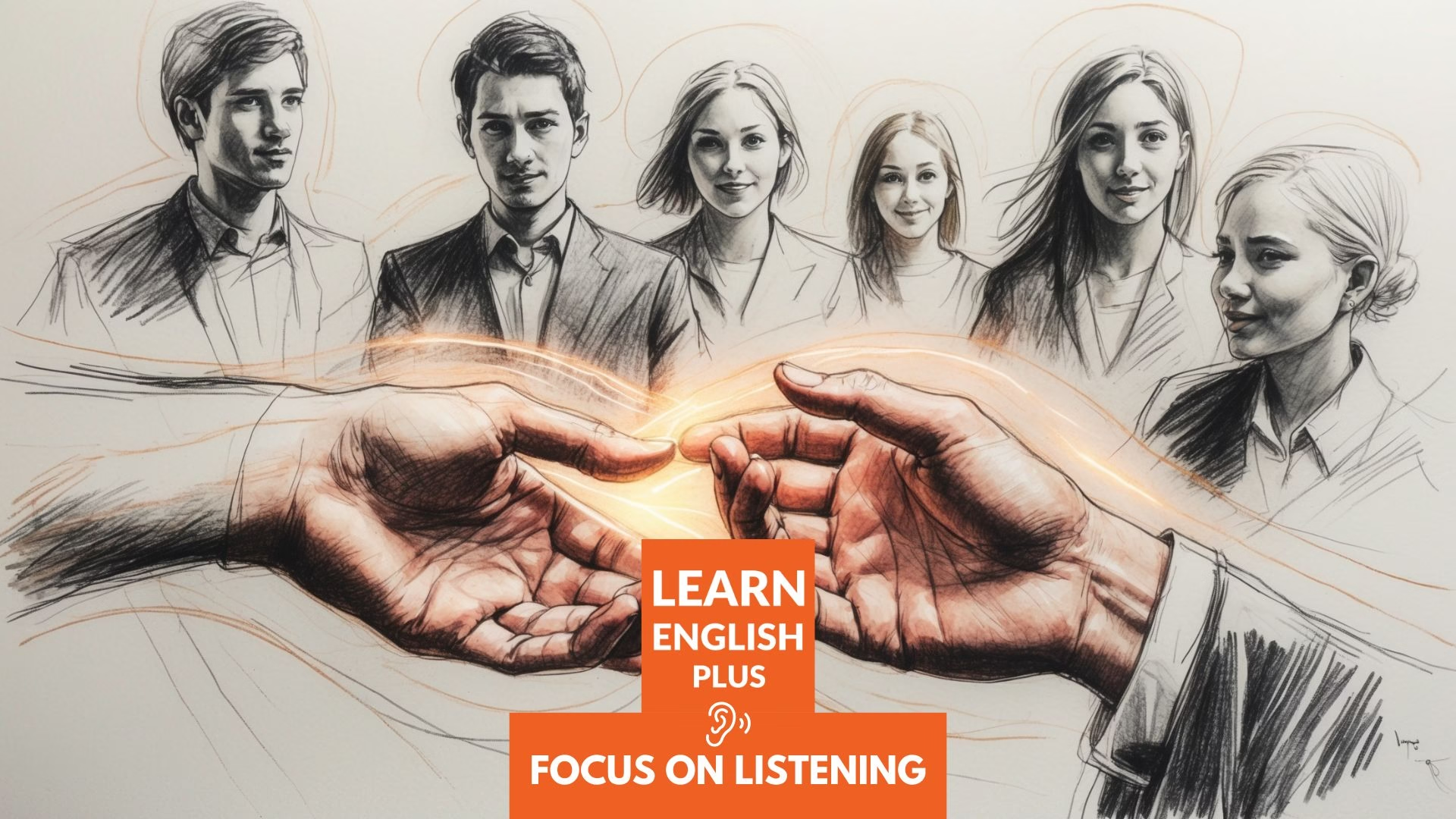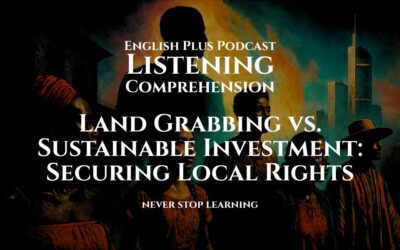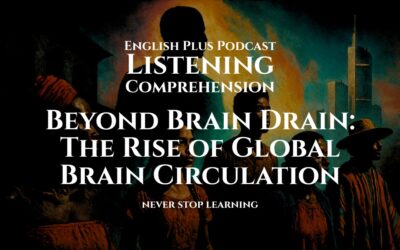Welcome back to our listening practice! Today, we’re going to delve into the vital role of empathy in our social interactions. Empathy, the ability to understand and share the feelings of others, is a cornerstone of healthy relationships and effective communication. This listening exercise will help you practice understanding abstract concepts, following a nuanced discussion, and recognizing the importance of emotional intelligence.
Before we listen to the script, here are some listening tips that can help you better understand discussions about social and emotional topics:
- Listen for Definitions: Pay attention to how the speaker defines key terms like empathy.
- Identify Examples: Speakers often use examples to illustrate how empathy works in real-life situations.
- Understand the Impact: Listen for the consequences of having or lacking empathy in social interactions.
- Recognize Different Facets: Empathy can have various aspects or components. Try to identify these as you listen.
- Consider Different Contexts: How does empathy play out in different social settings?
Ready to explore the power of understanding? Let’s listen to the script about the role of empathy in social interactions!
Listening Script: Please don’t read the transcript before you listen and take the quiz.
In the complex tapestry of human relationships, empathy stands out as a crucial thread, weaving connections and fostering understanding between individuals. It’s more than just feeling sorry for someone; it’s the ability to step into another person’s shoes, to understand their perspective, and to share their feelings, whether those feelings are joy, sorrow, frustration, or excitement. Empathy is the bedrock of effective social interactions, influencing everything from our personal relationships to our professional collaborations and even the broader fabric of society.
At its core, empathy involves both cognitive and emotional components. Cognitive empathy is the ability to understand another person’s thoughts and perspectives. It’s about being able to mentally put yourself in their situation and see things from their point of view. Emotional empathy, on the other hand, is the capacity to share another person’s feelings. It’s about feeling what they feel, to experience their emotions as if they were your own. Both of these aspects are essential for truly understanding and connecting with others.
Empathy plays a pivotal role in building and maintaining strong personal relationships. When we are empathetic towards our friends, family, and romantic partners, we are more likely to be supportive, understanding, and forgiving. Empathy allows us to navigate conflicts more effectively, as we can see the situation from the other person’s perspective and find solutions that address everyone’s needs. It fosters trust and intimacy, as people feel understood and validated when we show empathy towards them. Imagine sharing a difficult experience with someone who truly understands how you feel – that connection is often forged through empathy.
In the professional world, empathy is increasingly recognized as a vital skill for leadership, teamwork, and customer service. Empathetic leaders are better able to understand the needs and concerns of their team members, leading to increased morale and productivity. In teamwork, empathy allows individuals to collaborate more effectively, appreciating different viewpoints and working towards common goals. In customer service, empathy enables professionals to understand and address customer issues with greater sensitivity, leading to higher customer satisfaction.
Beyond individual interactions, empathy also plays a crucial role in broader social contexts. It is the foundation of compassion and altruism, motivating us to help those in need and to work towards a more just and equitable society. When we empathize with people from different backgrounds or with different experiences, we are more likely to challenge our own biases and prejudices and to promote inclusivity and understanding. Empathy can bridge divides and foster a sense of community.
However, empathy is not always easy. It requires us to be open-minded, to listen actively, and to be willing to step outside of our own perspectives. Sometimes, understanding another person’s feelings can be challenging, especially if their experiences are very different from our own. It’s important to remember that empathy doesn’t necessarily mean agreeing with someone’s actions or beliefs, but rather striving to understand their underlying emotions and motivations.
Furthermore, there can be challenges associated with excessive empathy. Sometimes, individuals can become so overwhelmed by the feelings of others that they neglect their own needs and well-being. It’s important to find a balance and to practice self-care while also being empathetic towards others.
In conclusion, empathy is an indispensable element of healthy and productive social interactions. It allows us to connect with others on a deeper level, build stronger relationships, navigate conflicts effectively, and contribute to a more compassionate and understanding society. Cultivating empathy is a continuous process that requires self-awareness, active listening, and a genuine interest in the experiences of others. By consciously practicing empathy in our daily interactions, we can enrich our relationships and contribute to a more harmonious world.
Glossary
- Complex tapestry of human relationships: The intricate and interconnected network of connections between people. Usage in the script: “In the complex tapestry of human relationships…”
- Crucial thread: A very important and essential element. Usage in the script: “…empathy stands out as a crucial thread…”
- Bedrock of effective social interactions: The fundamental basis or foundation for successful communication and relationships. Usage in the script: “Empathy is the bedrock of effective social interactions…”
- Cognitive and emotional components: The mental and feeling aspects of something. Usage in the script: “At its core, empathy involves both cognitive and emotional components.”
- Pivotal role: An extremely important or decisive part. Usage in the script: “Empathy plays a pivotal role in building and maintaining strong personal relationships.”
- Navigate conflicts more effectively: To deal with disagreements or disputes in a skillful and productive way. Usage in the script: “Empathy allows us to navigate conflicts more effectively…”
- Forged through empathy: Created or developed strongly through the ability to understand and share feelings. Usage in the script: “…that connection is often forged through empathy.”
- Increasingly recognized as a vital skill: More and more acknowledged as being extremely important. Usage in the script: “In the professional world, empathy is increasingly recognized as a vital skill…”
- Morale and productivity: The level of confidence and enthusiasm of a person or group, and the rate at which goods or services are produced. Usage in the script: “…leading to increased morale and productivity.”
- Common goals: Shared objectives or aims. Usage in the script: “…appreciating different viewpoints and working towards common goals.”
- Sensitivity: The quality of being easily affected by the feelings or experiences of others. Usage in the script: “…address customer issues with greater sensitivity…”
- Broader social contexts: Wider societal situations or environments. Usage in the script: “Beyond individual interactions, empathy also plays a crucial role in broader social contexts.”
- Foundation of compassion and altruism: The basis for feeling concern for others and the selfless concern for the well-being of others. Usage in the script: “It is the foundation of compassion and altruism…”
- Just and equitable society: A society characterized by fairness and impartiality. Usage in the script: “…and to work towards a more just and equitable society.”
- Challenge our own biases and prejudices: To question and confront our own preconceived opinions and unfair feelings. Usage in the script: “…we are more likely to challenge our own biases and prejudices…”
- Promote inclusivity and understanding: To encourage the involvement and acceptance of all people within a group or society, and to foster comprehension. Usage in the script: “…and to promote inclusivity and understanding.”
- Bridge divides: To connect or bring together things that are separate or different. Usage in the script: “Empathy can bridge divides…”
- Step outside of our own perspectives: To try to understand a situation from someone else’s point of view. Usage in the script: “…to be willing to step outside of our own perspectives.”
- Underlying emotions and motivations: The fundamental feelings and reasons behind someone’s actions. Usage in the script: “…striving to understand their underlying emotions and motivations.”
- Indispensable element: Absolutely necessary or essential. Usage in the script: “In conclusion, empathy is an indispensable element…”
- Continuous process: An ongoing and never-ending activity. Usage in the script: “Cultivating empathy is a continuous process…”
- Self-awareness: Knowledge and understanding of one’s own thoughts, feelings, and character. Usage in the script: “…requires self-awareness…”
- Genuine interest: A sincere and real curiosity or concern. Usage in the script: “…and a genuine interest in the experiences of others.”
- Harmonious world: A world characterized by agreement, peacefulness, and a lack of conflict. Usage in the script: “…contribute to a more harmonious world.”










0 Comments